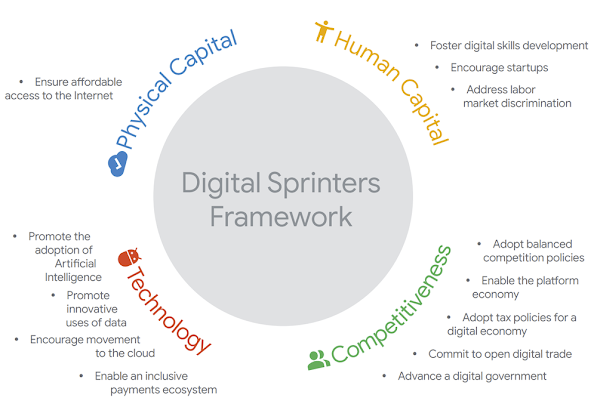The opportunity for “Digital Sprinters”
People around the world are confronting once-in-a-generation challenges: a global pandemic, an economic downturn of unprecedented proportions, rising demands for equity, and dramatic strains on financial resources.
The rain from this perfect storm is falling hardest on emerging markets. In many cases, they’re struggling to manage the pandemic with fewer public health resources and also suffer from greater economic vulnerabilities. Yet emerging markets also have some of the most vibrant economies and greatest entrepreneurial energy in the world. With the right policy frameworks, they can become ideal launching pads for future innovation. This challenging moment may be exactly the right time for these economies to pursue ambitious digital transformation, using their immediate recovery efforts to develop sustainable economic gains.
Nearly a third of U.S. small business owners are using digital tools to save their business during the COVID-19 crisis. In emerging markets too, digital technologies are often providing a lifeline: a plus-size clothes designer in Manaus, Brazil, a musical instruments maker in Istanbul, Turkey and an owner of a guest house in Durban, South Africa have all been able to survive by using digital technologies and online commerce.
Becoming “Digital Sprinters”
We call these emerging economies “Digital Sprinters” because, by becoming more digital, they have the potential to sprint ahead toward economic development. Based on our experiences, we believe governments and the private sector should focus on four key areas, as detailed in a report we're releasing today:

- Physical capital: this is about digital connectivity and infrastructure. It’s not just about investment but also how infrastructure is managed.
- Human capital: countries need a comprehensive approach to worker training, economic security, entrepreneurship, and combating discrimination.
- Technology: increasing the use of data, artificial intelligence, and cloud computing, which empower the growth of next-generation technologies and unlock future growth. This means new opportunities alongside new questions about how best to harness these technologies.
- Competitiveness: policies that promote competitive and open markets, interoperable regulatory standards, and tax regimes that are predictable and based on international standards.
Our recommendations reflect just one perspective on public policy frameworks for digital transformation. We hope that the report will help advance conversations about digitally-driven growth among governments, civil society, international organizations, academic institutions and entrepreneurs.
Potential economic gains
The economic potential from digital transformation is huge. A new study finds that, by 2030, digital transformation could generate as much $3.4 trillion of economic value in these Digital Sprinter markets. At a country level this translates to 25 percent of GDP in Brazil, 31 percent in Saudi Arabia and 33 percent in Nigeria, to name a few examples.
Emerging markets face a watershed moment today. As COVID-19 is disrupting world order and breaking supply chains, emerging markets have an opportunity to transform and emerge as stronger players. We hope these reports published today can play a part in helping decision-makers take advantage of these opportunities.
====

